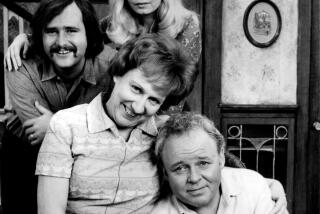Dear diary, they love us
- Share via
LONDON — Corny language, dubious plots and punishing reviews have never been enough to keep British thriller writer Jeffrey Archer off the bestseller lists, so there’s no reason that incarceration in one of Britain’s maximum security prisons for perverting justice should be much of a hindrance either.
Lord Archer, as the British Tory peer is formally known here, is back on the British book charts with “A Prison Diary,” an almost hour-by-hour account of three weeks in London’s Belmarsh prison at the start of his four-year jail term for lying under oath. Sneeringly dedicated to “Foul Weather Friends” and filled with the horrors of gentrified taste buds meeting prison food for the first time, the diary has been promoted by its publishers as a “devastating indictment of the British penal system.”
It is less than that, of course, but it does confirm Archer’s reputation as a scrapper. Climbing, falling and rising again in London political and society circles is Archer’s true canon. And “Prison Diaries” has pulled him back from the precipice of what he would see as disaster: the ignominy of being out of the news.
With a self-marketer’s instinct, Archer has caught the current wave of fascination with published diaries. The British have a recurring affinity for reading those who write ostensibly only to themselves, a tradition that runs from 17th century Londoner Samuel Pepys, who arguably created the diary form, to Helen Fielding, whose fictional “Bridget Jones’s Diary” became a late-20th century smash.
“Overall, there is more appetite for published diaries in the U.K. than there is here,” says Morgan Entrekin, president of the Grove/Atlantic publishing house in New York. Although there is a market for diaries in the U.S., it tends to appeal to specialized tastes “unless, of course, your name is Kurt Cobain,” Entrekin says of the Nirvana singer’s soon-to-be published journals.
But Britain has seen a deluge of mass-market diaries this fall, none from an author with the celebrity cachet of a Cobain. Instead, they come from the fringes of British politics and society, from those who were voyeurs to power rather than practitioners of it.
All are tantalizingly malicious. Thanks to the recent publication of “The Unexpurgated Beaton,” a fuller and franker version of the photographer and royal courtier’s old diaries, we now know what Sir Cecil really thought about the stars and snobs he socialized with.
It is joined on the racks by the third and final volume from the Conservative Party’s late but forever lovable rogue Alan Clark, whose previous two volumes of splenetic diary entries were surprising bestsellers in Britain.
But the real fireworks came upon the release of the extramarital tattlings of Edwina Currie’s “Dairies, 1987-92” that rocked the country.
The onetime member of Parliament of marginal political influence exposed her four-year affair with her then-little-known colleague John Major, who would become prime minister -- and leave her behind on the escalator of ambition -- in 1990.
Currie hit headlines beyond the book pages with her revelations of this unlikely coupling (she is an inveterate attention-monger; Major, until now at least, the definition of staid). She called him B, as in the second lover in her life, a tag that seems unnecessarily coy given the cringing detail she goes into about their affair: his “big blue underpants,” their conversations about God while she was in the bath, his comfort at being able to “philosophize and explore new talents in bed.”
Currie kept the affair just between her and her diary for 14 years, an approach to spilling the beans that left her open to charges she published only for the money and attention. She has been widely vilified for outing Major (he has since described the affair as the event in his life of which he is “most ashamed”) and defended by a far smaller minority for her candor.
But having figuratively disrobed early by offering her Major scoop to the Times of London for serialization, she may also end up with fewer book sales than the other diarists.
It is Archer who is most likely to lead the pack in sales (only he among the political diarists has landed an American publisher), although there has been much amused discussion over whether given the author’s well-chronicled looseness with the truth, his diary should be placed on the nonfiction or fiction shelves. His jail sentence was handed down in 2001 for perjury committed during an originally successful 1987 libel trial against the Daily Star, a tabloid that suggested he had spent a night in the company of a prostitute.
Fourteen years later, Archer was proved to have paid an associate to lie about his whereabouts on the night in question. Among those who testified against him was his former secretary, who said Archer ordered her to make false entries in the appointments diary he then used in court for his alibi.
Convicted of perjury and required to repay the $750,000 libel award plus legal costs to the Star, Archer set about writing a prison diary within hours of landing in Belmarsh. Readers accustomed to seeing his name call out in gilded lettering from airport paperback racks will have to look a little harder for this book. The cover says only that it was written by prisoner FF 8282.
But the words on the page are unmistakably Archer: unrepentant, blustery, vaguely threatening to his enemies. “I would like to say how much I enjoyed your books, particularly ‘The Prodigal Daughter,’ ” a fellow inmate doing time for a double murder tells him during exercise rounds on July 23, 2001, before adding “and by the way, if you want that ... secretary bumped off I’ll be happy to arrange it for you.”
If nothing else, Archer amuses. He is already promising to publish future volumes as he moves through the prison system, perhaps encouraged by the $300,000 he will reportedly receive for his work.
(Laws against profiting from one’s crime mean Archer won’t collect his “advance” until after his release.)
But it is Alan Clark’s diaries that may survive to be read a generation from now. The onetime junior cabinet minister under Margaret Thatcher has built a literary following that dwarfs his comparatively lowly political achievements. Combined sales of his three volumes of diaries already top 400,000, roughly four times the number of copies Major sold with his prime ministerial memoirs.
“It’s a soap opera,” says Ion Trewin, the editor who turned Clark’s scrawl into published form, explaining the enduring appeal of a central character who is in parts vain, a crashing snob, a hypochondriac and an adulterer.
“There are all these strands of stories going on and recurring characters moving in and out. They almost become friends to the reader and you start to ask yourself: ‘Hey, what ever happened to that gardener anyway?’ ” Trewin argues that Clark’s following is based on his fine writing and powers of observation, which is true enough although sales of the first volume were boosted in 1994 when the wife and two daughters of a prominent judge publicly admitted they were the three lovers Clark referred to in the diaries as his “coven.”
But his writing stands as a wonderfully opinionated snitch’s inside view of the Thatcher era. “The best political diaries have always come from those who never made it all the way to the top, who don’t have to worry about wielding power,” Trewin says. “But they are very, very socially adept, and close enough to power to pick up the good gossip.”
Indeed Clark’s most subtle achievement may have been to capture the dimming of the light of Tory Britain. By the third volume, he is no longer a political player, thrust, like his party, to the fringes of influence, his ambition shriveling. The mood becomes melancholy, and there are disturbing hints along the way of the fatal brain tumor to come. By the end, there is a retreat into the comfort of his family at last.
“Good diarists must be a bit in love with themselves,” says author Claire Tomalin, who read dozens of them on her way to writing a just-released biography of Pepys called “The Unequaled Self.” “The best diaries are entertaining because they always have some bite to them.” Archer, Currie and Clark show those lessons still hold in the age of celebrity. The diary’s appeal as a savage art form survives, a sign of the enduring allure of malice.
More to Read
Sign up for our Book Club newsletter
Get the latest news, events and more from the Los Angeles Times Book Club, and help us get L.A. reading and talking.
You may occasionally receive promotional content from the Los Angeles Times.









